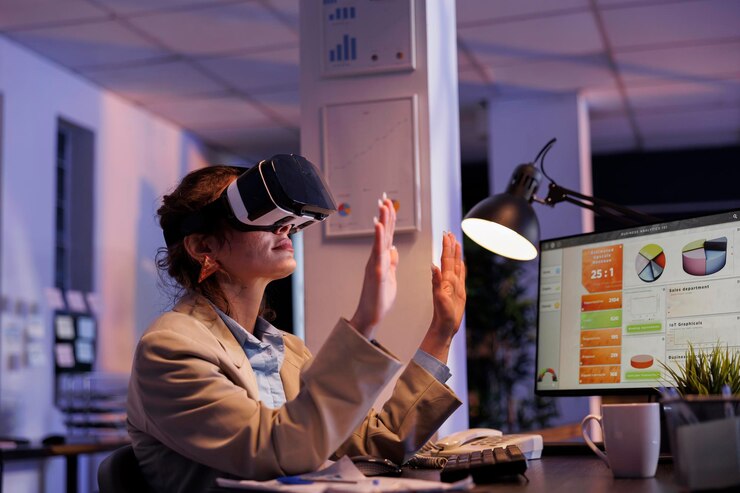Overview
Introduction Virtual reality is a game-changing technology. And that is swaying various industries, going outside the worlds of science fiction and video games. VR is changing how businesses run, train their employees. And interrelate with customers by producing immersive experiences that mimic the actual world or a fantastical one. This article examines how virtual reality is influencing the industry and influencing the future.
Medical Care
The healthcare sector is among the areas where virtual reality is having the biggest effects. To lower the danger during real surgeries, surgeons rehearse challenging procedures using virtual reality simulations. Virtual reality (VR) helps medical students by providing them with truthful simulations that improve their skills without endangering actual patients. Virtual reality is being utilized in patient therapy. And offering immersive settings to help cure illnesses including chronic pain and PTSD anxiety. For instance, in a safe setting, virtual reality exposure therapy assists patients in facing and controlling their concerns.
Training and Education
Virtual reality Professional training and education are being revolutionized by changing industries. Virtual reality (VR) in the classroom proposals students immersive learning experiences that make difficult subjects more friendly and interesting. Students digitally travel to ancient nations, bringing history courses to life. Additionally, virtual laboratories make science classes more participatory. Virtual reality provides hands-on practice in a risk-free setting for staff training in professional settings. For example, pilots can replicate flight circumstances without the risks of real-world training, and firemen can experience realistic training scenarios.
Property
The real estate sector is using virtual reality (VR) to recommend virtual product tours, allowing potential buyers to view homes other lucrative properties from any location in the world. This ability reduces possibilities prior to in-person visits, saving time and money. Additionally, virtual reality (VR) can contribution architects and builders in imagining projects through the design phase, which eases the early detection and resolution of any problems. By providing a truthful sample of the property, this not only accelerates the decision-making process but also improves the overall consumer experience.
Shops
Virtual reality enhances the shopping experience in the trade industry by letting customers to try products before making purchase. Customers may see how clothing will fit and look in virtual right rooms without ever having to try it on. Customers can use virtual reality (VR) to see how items will appear in their homes, which helps them make better assortments about what to buy. Both customers and retailers stand to improvement from this immersive experience’s ability to boost customer receipt and decrease return rates.
Producing
VR is being used by manufacturing businesses to enhance growth and creation design. Before physical industrial starts, engineers and designers can develop and test examples almost to find any flaws and make necessary adjustments. This speeds up the development process and lowers costs. This is particularly helpful when working with complicated machinery and machinery where errors can be costly and hazardous.

Media and Entertainment
VR has been quickly adopted by the entertainment sector, with important effects on live events and video games. Players can immerse themselves in new worlds through virtual reality gaming, which offers an unparalleled level of detail. Virtual reality is being used in the film business to develop communicating storytelling experiences that let viewers contribute in the story. VR provides virtual front-row seats to live events, such as concerts, sporting events, and dramatic productions, allowing worldwide audience to attend without having to travel.
Travel
By providing virtual travel methods, virtual reality is transforming the travel and tourism sector. From the comfort of their homes, people may visit places all over the world, which is especially useful when travel is prohibited. Virtual reality tours of well-known sites, museums, and natural wonders offer an engaging experience that may influence future travel arrangements. By providing potential tourists with a preview of what to expect, this technology also enables travel agencies to promote destinations more effectively.
In conclusion
Virtual Reality Changing Industries is revolutionizing a number of industries by providing innovative solutions that improve consumer interaction and good organization. The use of VR technology will expand as it develops further, resulting in even more significant changes to how companies function and interact with their clientele. Approval VR can help enterprises remain ahead of the curve in a rapidly evolving technological landscape by giving them a ready-to-action edge.

